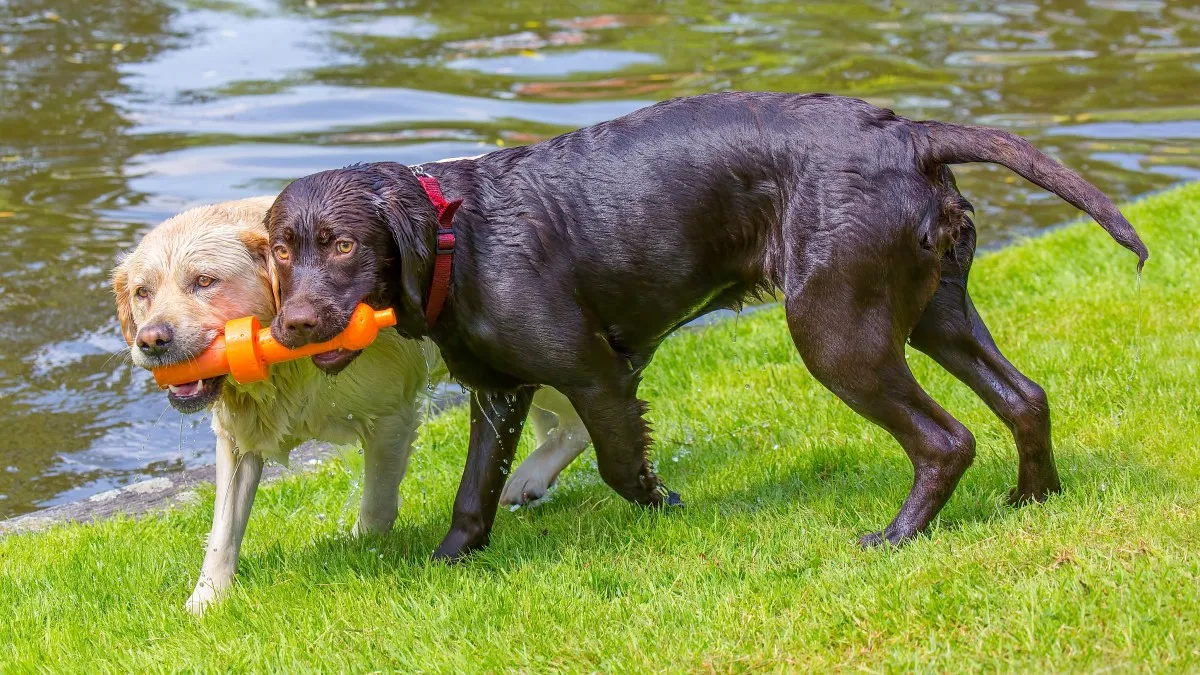Giardia in dogs is a common concern for pet owners. But what happens when you, as the owner, start experiencing similar symptoms, namely diarrhea? While it’s understandable to immediately connect the dots, it’s important to understand the complexities of Giardia transmission and its potential impact on both you and your furry friend. This article breaks down the facts about Giardia, how it spreads, and what to do if both you and your dog are experiencing symptoms.
Understanding Giardia
Giardia is a microscopic parasite that can infect the digestive system of both animals and humans. It’s found in contaminated water and soil and can be transmitted through the fecal-oral route. While Giardia is a zoonotic disease (meaning it can be transmitted from animals to humans), the specific strains that typically infect dogs and cats are often different from those that infect humans.
Signs and Symptoms of Giardia
Whether in humans or canines, Giardia infection can manifest with several signs and symptoms, including:
- Diarrhea
- Gas
- Stomach pain
- Nausea
- Vomiting
It’s crucial to remember that some individuals, both human and animal, can be infected with Giardia and show no outward symptoms. These asymptomatic carriers can still shed the parasite and contribute to its spread.
How Dogs Contract Giardia
Dogs can become infected with Giardia through various means:
- Contaminated Water: Drinking from creeks, ponds, lakes, or even puddles contaminated with Giardia.
- Fecal-Oral Transmission: Ingesting even small amounts of contaminated feces from other animals.
- Contaminated Environment: Rolling, playing, or licking themselves after contact with contaminated soil or surfaces like dog crates or litter boxes.
 Two wet retriever dogs have one toy in both of their mouths. The dogs are outside on a grassy slope next to water.
Two wet retriever dogs have one toy in both of their mouths. The dogs are outside on a grassy slope next to water.
Can You Get Giardia From Your Dog?
This is the key question. While possible, it’s unlikely that you contracted Giardia directly from your dog. As mentioned earlier, different Giardia strains often affect humans and dogs. However, there’s still a risk, especially if you have other types of pets, such as chinchillas or birds, as they can spread types of Giardia that can infect humans.
What To Do If You and Your Dog Both Have Diarrhea
- Consult Your Doctor and Veterinarian: The most important step is to seek professional medical advice for both yourself and your dog. A doctor can diagnose the cause of your diarrhea and recommend appropriate treatment. A veterinarian can diagnose your dog’s condition through fecal testing and prescribe medication if Giardia is confirmed.
- Hygiene is Paramount: Regardless of the source of infection, strict hygiene practices are crucial to prevent further spread. Wash your hands thoroughly with soap and water after handling your dog, their food, or anything they’ve come into contact with.
Prevention: Protecting Yourself and Your Pet
Even if your diarrhea isn’t directly related to your dog’s Giardia infection, taking preventive measures is essential.
Preventing Spread from Pets to People:
- Wear gloves when gardening or handling soil, especially if you suspect contamination.
- Clean and disinfect pet items regularly, including toys, crates, and food bowls.
- Wash your hands thoroughly after any contact with pets, their feces, food, or supplies.
Preventing Re-infection and Spread Among Pets:
- Inform your veterinarian if you have multiple pets, even if they aren’t showing symptoms. Asymptomatic carriers can still spread Giardia.
- Bathe your dog to remove any fecal matter from their fur.
- Clean litter boxes daily.
- Limit access to contaminated water sources like creeks and ponds.
Cleaning and Disinfecting:
While your pet is sick, focus on disinfecting potentially contaminated areas:
- Toys
- Water and food bowls
- Bedding
- Crates
- Litter boxes
- Floors
Clean items outside if possible. If cleaning indoors, use a laundry sink or bathtub and disinfect the area immediately afterward.
Reducing Giardia Outside:
While complete elimination is difficult, these steps can reduce the risk:
- Remove feces promptly: Dispose of waste in a sealed bag.
- Limit access to public areas: Avoid dog parks and trails while your dog has diarrhea.
- Remove standing water: Empty containers and fountains.
- Avoid harsh chemicals: Do not use bleach or quaternary ammonium compounds on soil or grass, as they are ineffective against Giardia in these environments.
Testing and Diagnosis
If your dog has persistent diarrhea, a veterinarian will likely perform a fecal test to check for Giardia and other parasites. Multiple samples may be needed, as Giardia isn’t always shed in every bowel movement.
Treatment and Recovery
A veterinarian will prescribe appropriate medication to treat Giardia. Follow their instructions carefully and attend all follow-up appointments.
Giardia in Dogs: Key Takeaways
While the prospect of contracting Giardia from your dog may be concerning, it’s not the most likely scenario. Different strains of Giardia often affect humans and dogs, but maintaining good hygiene and taking preventative measures is paramount. If both you and your dog are experiencing diarrhea, consult your doctor and veterinarian for proper diagnosis and treatment. Remember, early intervention can prevent dehydration and other serious complications.
